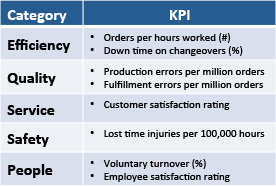In introducing the topic of metrics, we described some metrics as being leading indicators of value creation. Items such as customer satisfaction, plant safety, and regulatory compliance are all critical to creating value. Marketing metrics are important in managing the marketing function; operating metrics are important in managing operations, etc. Furthermore, most early stage companies do not have, and are not expected to have, any financial results at all. They may have an investment thesis or a project plan, and an explicit or implicit capital budget for achieving it, but that budget is likely to be associated with non-financial milestones rather than with anything found on an income statement or balance sheet.

What non-financial metrics miss However important it may be to meet the standards of non-financial metrics, they don't answer the overriding question of business: To what end? To what end are we making customers happy? To what end are we making our plants safer? Achieving those individual goals may be critical to value creation, but there are innumerable ways of achieving them that do not accrue to the benefit of the owners.
Selling our best products for half the price of our competitors would make our customers very happy, but could destroy our ability to finance the operations of our business. Giving our employees ten hours a week to work on whatever they want might make them happier, and perhaps even more productive for the rest of their working hours, but it may cripple overall productivity. The fact is that no metric, or set of metrics, can encapsulate the trade-offs that an owner would make with regards to their business, except for some governing metric that accounts for all factors of production and the full revenues derived from that production. Balanced scorecards, however helpful they might be in guiding teams in undertaking specific intitatives, are inherently unbalanced when it comes to ultimately evaluating their performance with respect to the end result of value creation. When it works Non-financial metrics work well in the following contexts: Achieving plans may lead to value creation, but it is not the same thing as value creation. Plans are inputs. Value creation is an output, and can always be measured in terms of financial value by the owners of the business.